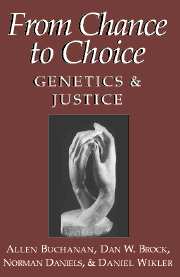Book contents
- Frontmatter
- Contents
- Preface
- CHAPTER ONE INTRODUCTION
- CHAPTER TWO EUGENICS AND ITS SHADOW
- CHAPTER THREE GENES, JUSTICE, AND HUMAN NATURE
- CHAPTER FOUR POSITIVE AND NEGATIVE GENETIC INTERVENTIONS
- CHAPTER FIVE WHY NOT THE BEST?
- CHAPTER SIX REPRODUCTIVE FREEDOM AND THE PREVENTION OF HARM
- CHAPTER SEVEN GENETIC INTERVENTION AND THE MORALITY OF INCLUSION
- CHAPTER EIGHT POLICY IMPLICATIONS
- APPENDIX ONE THE MEANING OF GENETIC CAUSATION
- APPENDIX TWO METHODOLOGY
- References
- Index
APPENDIX TWO - METHODOLOGY
Published online by Cambridge University Press: 05 June 2012
- Frontmatter
- Contents
- Preface
- CHAPTER ONE INTRODUCTION
- CHAPTER TWO EUGENICS AND ITS SHADOW
- CHAPTER THREE GENES, JUSTICE, AND HUMAN NATURE
- CHAPTER FOUR POSITIVE AND NEGATIVE GENETIC INTERVENTIONS
- CHAPTER FIVE WHY NOT THE BEST?
- CHAPTER SIX REPRODUCTIVE FREEDOM AND THE PREVENTION OF HARM
- CHAPTER SEVEN GENETIC INTERVENTION AND THE MORALITY OF INCLUSION
- CHAPTER EIGHT POLICY IMPLICATIONS
- APPENDIX ONE THE MEANING OF GENETIC CAUSATION
- APPENDIX TWO METHODOLOGY
- References
- Index
Summary
This appendix aims to address issues about the methodology of moral reasoning used in this volume. Because many, perhaps most readers will not be especially concerned about such issues, we have chosen to address them here, rather than impeding the flow of analysis in the text.
As much as at any time in the recent past, there is considerable controversy about the proper methodology for ethical analysis, especially in bioethics (Jonson and Toulmin 1988; Gillen and Lloyd 1994; Clouser 1994; Clouser in Gert 1996). Our purpose here is not to resolve these complex issues, only to make it clear that our choice of methodology is reflective (rather than reflexive), and to deflect what we take to be certain spurious but unfortunately predictable objections to our methodology. We are under no illusion that what we say here will render our work immune from methodological criticisms. We hope, rather, at least to clear the field of spurious criticisms to make room for serious ones.
THE METHOD OF REFLECTIVE EQUILIBRIUM
The Charge of Parochialism
In Chapter 1, we noted that we use a familiar method for moral inquiry, that of wide reflective equilibrium. That method is easily criticized – if represented in caricature form. In the end, the best defense of this method is to put it into action, as we have done, and let it be judged by its results.
- Type
- Chapter
- Information
- From Chance to ChoiceGenetics and Justice, pp. 371 - 382Publisher: Cambridge University PressPrint publication year: 2000



